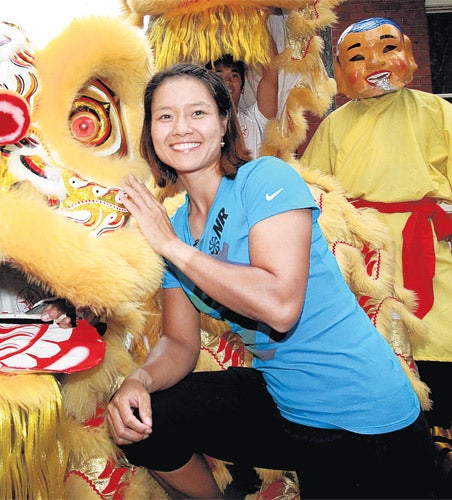Li looking good to take maiden Grand Slam win for China

China has broken through many sporting barriers over the last two decades but the world's most populous nation has yet to produce a Grand Slam champion. Li Na is hoping to change all that. The 28-year-old world No 11 reached the Australian Open semi-finals for the second year in succession here yesterday and has good reason to believe she can improve on her performance of 12 months ago.
Li, who outpowered Germany's Andrea Petkovic 6-2, 6-4 in the quarter-finals yesterday, is unbeaten this year, having won the Sydney tournament 11 days ago by beating Kim Clijsters in the final. Clijsters, the favourite to win the title here, was due to meet Poland's Agnieszka Radwanska in the quarter-finals earlier today.
Petkovic believes Li will win the tournament. In tomorrow's semi-finals, the Chinese No 1 meets Caroline Wozniacki, a 3-6, 6-3, 6-3 winner over Francesca Schiavone. Li won both her matches last year against the 20-year-old Dane, who was one of her victims here before she lost to the eventual champion, Serena Williams, who is missing this year through injury.
Given that the Australian Open bills itself as "The Grand Slam of Asia/ Pacific", this would be an appropriate place for China to break their Grand Slam duck, although Li says she generally does not like the conditions here, which she finds too hot after arriving from the Chinese winter.
Li's recent progress is remarkable, given that she did not pick up a racket for two years after giving up the game at the age of 20 to go to university. At the time, all Chinese players were obliged to join the national tennis programme and Li, against her wishes, had to concentrate on doubles because that was where the authorities saw the best prospect of Olympic success.
However, Li's then boyfriend Jiang Shan – now her husband and coach – persuaded her that she might regret not giving the sport another try. Within months she became the first Chinese to win a singles title on the main women's tour and has not looked back since.
Today, Chinese players are allowed to opt out of the state system. They keep 92 per cent of their prize-money, though they have to pay for all their running costs, unlike those within the national programme. There are four Chinese women in the top 100 in singles: Li (world No 11); Jie Zheng (No 27), who reached the semi-finals here and at Wimbledon three years ago but is currently injured; Peng Shuai (No 54) and Shuai Zhang (No 91). However, there are no Chinese in the top 300 of the men's singles rankings.
Jiang, a childhood friend, became Li's coach four years ago, at a time when she was still on the state programme. The national authorities do not usually approve of players having personal relationships with others within the sport. "Of course, we do not interfere with their private lives, but we will help the players find a boyfriend when needed," Jiang Hongwei, the national team tennis coach, said at the time.
Li gives her husband much of the credit for her success. "Because he was also a tennis player he knows what a player is thinking about on the court," she said. "I trust him a lot. We have good communication. I am happier with him there on the court. During practice if there's something I don't like I can say it directly to him."
She joked that he was the one in control, even when it came to buying anything with her credit card. "When you use the credit card the Chinese bank will send a text message saying where you are and how much you're spending. If I use it, he will know for sure. He will call and ask: 'Where are you?' I can use the credit card, but he is still totally in control."
Despite the current success of the leading Chinese women, there is a vacuum beneath them. There are no outstanding players in the 18-22 age group, although there are high hopes for the current crop of juniors. The 64-player draw here for the girls' junior tournament features seven Chinese players.
A source within the Chinese game said: "There has been a feeling that some of the young Chinese players have had too comfortable a life. It's very similar to what people say about young players in Britain. When players like Li Na and Zheng Jie were coming through they grabbed every opportunity they could. They didn't get many chances to compete overseas and they were determined to make the best of their opportunities.
"People say the generation after them have had things too easy. They are given plane tickets and hotel rooms and their coaches are paid for. They don't have to fight for things any more."
Li now takes on Wozniacki, who trailed by a set and 3-1 to Schiavone before winning a hard-fought match in two hours and 14 minutes. Her Italian opponent seemed to tire in the latter stages, perhaps paying the price for her exertions two days previously, when she won the longest Grand Slam match in history against Svetlana Kuznetsova after four and three-quarter hours.
Having apologised two days earlier for inventing a story about being scratched by a kangaroo, Wozniacki entered her post-match press conference with an inflatable toy kangaroo and a pair of boxing gloves. "I know there were a lot of requests for a picture of me with the kangaroo, so here it is," she said. "Now I have the gloves on so I'm actually ready to fight just in case it attacks me."
Join our commenting forum
Join thought-provoking conversations, follow other Independent readers and see their replies
Comments
Bookmark popover
Removed from bookmarks